As an appellate attorney, I have read a zillion pages of trial transcripts. Often the words and phrases used by people involved in the trial are amusing and/or bizarre.
The transcripts quoted from and posted here are public records, so no ethical violations occur in sharing this information. Even so, all the names have been blurred to protect the privacy of the guilty and not guilty alike.
Besides sharing the photo of the actual transcripts (to show that all of this really happened), I am also quoting what occurred for those who cannot load photos and/or load photos too slowly.
WARNING TO ANIMAL LOVERS: There is no love between a cat and a bird in words from this first transcript. If victim vs. prey scenarios between two different animal species bother you, skip ahead to the first snow scene.
Prosecutors like to use examples to explain circumstantial evidence.
PROSECUTOR: The bird is in the bird cage, and it’s swinging back and forth and all that. You put a cat in the bird cage, and you cover it with a blanket. You pull off the blanket, and the only thing in the bird cage is the cat. So, Mr. *, what do you think happened to the bird?
JUROR: Don’t have to feed the cat.
The juror got the point.
Prosecutors also like to try to combat what may seem to be a ridiculous defense in regard to circumstantial evidence. A common way to do so is for a prosecutor to describe a situation where someone goes to sleep when there is no snow on the ground. The next day, there is snow on the ground. Ergo, the circumstantial evidence serves as decent proof that it snowed overnight. The following occurred after the prosecutor had set-up the next-day snow scenario:
MS. PROSECUTOR: Is it possible that some of your buddies played a trick on you and rented some snow machines and put it [the snow] around your yard and maybe got a couple of your neighbors’ yards to just make sure the prank was good and got out of there by the morning?
JUROR: I don’t have any friends that smart.
In the next case, the juror and the prosecutor both seem to have some low opinions of the sanctity of marriage.
PROSECUTOR: Who would ordinary [sic, ordinarily] see a strip club robbery? Who are eye witnesses you would expect?
PROSPECTIVE JUROR: A married man.
PROSECUTOR: Married men? That’s fair.
Then, there’s always the way mental illnesses are handled at trial. One attorney, during an opening statement, even went so far as to blame his mental health problems on marriage.
ATTORNEY: I was on psychotropic medications for 10 years, Effexor, Luvox, Paxil; took them for OCD and depression. Then I got divorced and realized I’m cured, didn’t need the meds anymore.

Next, what happens when a juror feels sick? Who wants to sit next to someone who is nauseated? Juror Ha**** certainly did not. And I don’t blame him. The following lines of transcript are from the “Ew, gross” category.
DEFENSE COUNSEL: Can you promise me that you will try to do it [be fair] if you’re selected as a juror in this case?
JUROR HI***: Yeah, as long as I don’t get in trouble for throwing up something. I’m not being funny.
DEFENSE COUNSEL: No, ma’am. I —
THE COURT: You won’t get in trouble, Ms. Hi***, for throwing up. I promise you.
JUROR HA***: Just don’t splash this way.
I don’t remember why the prosecutor mentioned a walking stick in the next case, but here’s what was said:
PROSECUTOR: People typically walk with a stick because anticipation if someone tries to rob me or whatever, I’m going to defend myself, right?
JUROR: It could be cool, though, to have a walking stick.
This is funny to me because in Seinfeld, Kramer took a walking stick to an unparalleled level of coolness, although the walking stick played a part in his arrest, too. The episode, written by Spike Ferensten, was called “The Wig Master.”
In another case, a gunshot had gone through a couch. Defense counsel needed to clarify:
DEFENSE COUNSEL: He’s not charged with shooting with intent to kill the couch.
When a defendant’s crimes received two consecutive life terms, the following occurred:
THE COURT: You know, it’s basically such a long time—period of time, I don’t know that you could live out two life sentences in the penitentiary. Do you understand that?
THE DEFENDANT: Yeah, I understand fully. There’s no way I could live that long.
Not all defendants are honest in every case, but the defendant in the next case certainly was.
PROSECUTOR: Mr. *, when you tested positive for opiates, what did you use?
DEFENDANT: I used Percocet.
PROSECUTOR: Okay. And why did you use Percocet?
DEFENDANT: I mean, I’m a drug addict.
Do you remember the “This is your brain on drugs” commercials? The commercials were later parodied in various ways, including a Homer Simpson T-shirt with a photo of his face and the saying, “This is your brain on donuts.” And just as the original commercial plus most of the parodies end, I ask you, “Any questions?”
In the next case, the trial judge had to clarify what he meant by a short witness.
THE COURT: You have somebody short enough to put on [the witness stand]?
MS. PROSECUTOR: I have someone short as long as it’s not —
THE COURT: And I’m speaking about length, not height.
One prospective juror, when asked about his most memorable life experience, said, “Probably when they kicked me out of the bar the other night. Write that down.” He never explained why he seemed so proud of this experience.
Attorneys often have to remind witnesses that they need to speak words aloud instead of using gestures so that the court reporter can properly record responses. One witness at first took the reminder seriously.
Q. [By the prosecutor]: Can you say yes, please?
A. [By the witness]: Yes, please. I mean, yes.
There was already a transcript story which included a cat, so there has to be a story about a dog somewhere in a transcript, right? What about a dog who can drive?
PROSECUTOR: And so when you located the items [of contraband], did you identify the items in your report or did someone else detail the items that were located?
FIRST OFFICER: [Second] Officer* detailed them. I actually do not have a back seat in my car. I have a canine. He is the one who transported the subject for me.
Did you know there are lots of videos on YouTube of dogs driving cars? I wonder if any of these dogs ever transported a subject. Of course, I know the officer in the case cited didn’t really mean that the dog drove the car. He was referring to a different officer (i.e., the second officer] driving a different car. Still, the wording was way off.
[SIDEBAR: Years ago, when my nephew Joseph was in elementary school, he talked about how smart his dog was. He finally said, “My dog is so smart that he can drive a car.”
I responded, “I’d like to see a picture of that.”
Joseph, without missing a beat and in all seriousness, said, “Well, I didn’t have a camera with me at the time.”]
Later in the same case of the sounds-like-a-car-driving dog, the second officer who actually transported the defendant testified.
SECOND OFFICER: I took custody of those items, and I transported the suspect to jail.
PROSECUTOR: Okay, why did you transport him?
SECOND OFFICER: Because [First] Officer*** has a canine, and he doesn’t have the capabilities.
This sounds like the dog, not the other officer, could not drive after all. The canine just doesn’t have the capabilities. (And yes, I get what the second officer was actually trying to convey).
Who knew that I would one day be reading evidence about cheese balls? Defense counsel moved to admit photos of cheese balls into evidence, but the trial judge denied this attempt. This scenario is too stupid to even explain. Suffice it to say that evidence from a trial has to be kept for an appeal, and no one wants to come across old cheese balls as Exhibit A.
In this same case, the attorney was trying to show that the defendant was not good at thinking.
ATTORNEY: [He is] A loner into video games and thinks he can make a good living on $58,00 and his first car will be a Lamborghini.”
Someone doesn’t know the actual cost of a Lamborghini. I think it’s the defendant.
[SIDEBAR: My cousin’s son once told me about his friend who had won $8,000 at a casino, then added, “So, he quit college and quit his job.” Hmmm, that $8000 isn’t going to last too long. The Lamborghini defendant isn’t the only one who is incredibly bad at math].
In another case, one prospective juror had the first name of “Justice.” The source of the name came as a surprise.
MS. PROSECUTOR: Well, first of all, your first name is fantastic.
PROSPECTIVE JUROR: Thank you.
MS. PROSECUTOR: Who picked Justice [as your first name]? Who decided that?
PROSPECTIVE JUROR: My dad.
MS. PROSECUTOR: Your dad? What does your dad do?
PROSPECTIVE JUROR: He’s in prison.
After hearing about the double major of a potential witness in another case, the trial judge proved his own point by misusing basic grammar.
THE COURT: Okay. Way smarter than me, so I’m not sure we’ll have a lot of conversations.
Judge, technically, you should have said “smarter than I am.” In all fairness, though, this is a common grammatical error which occurs far too frequently.
There is always someone watching your words, whether those words are spoken or written. Words have power to convey thoughts (and sometimes, mis-convey thoughts). Our job as writers is to put our thoughts to paper in the best way possible. Of course, you won’t ever get to editing and polishing your writing if you don’t write something first. My wish for all of you for the rest of this year and all of the next year is this: Write, you wonderful writers!






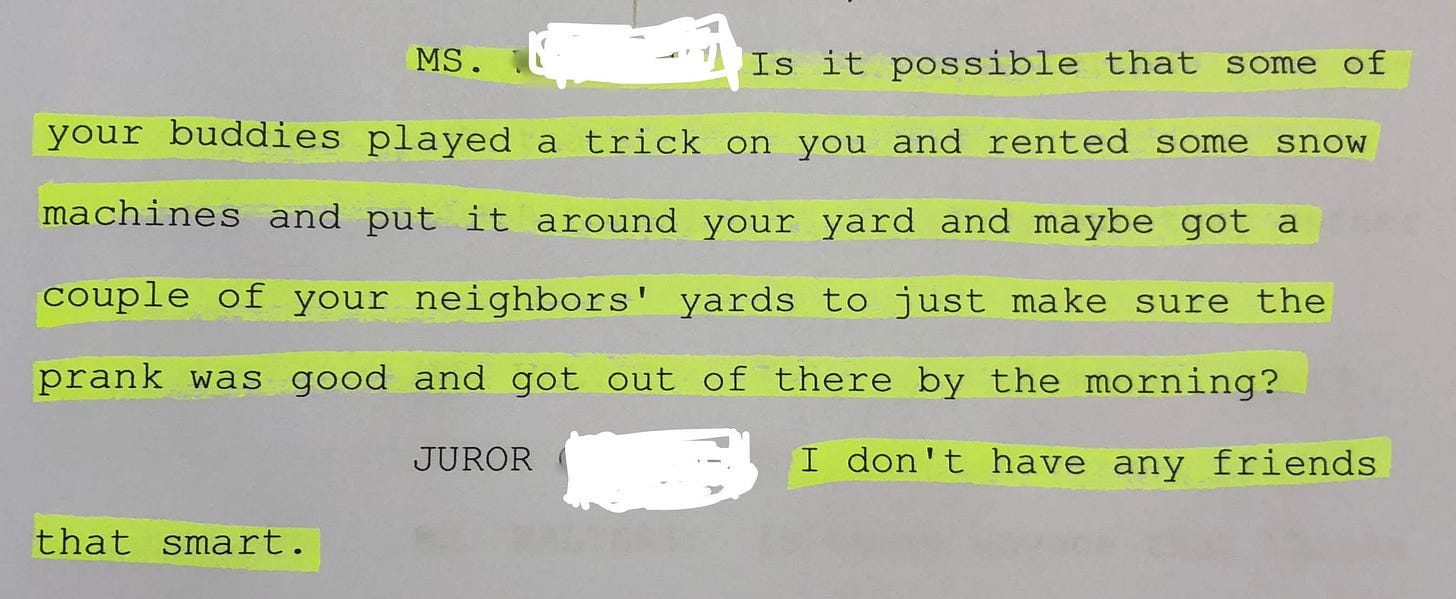


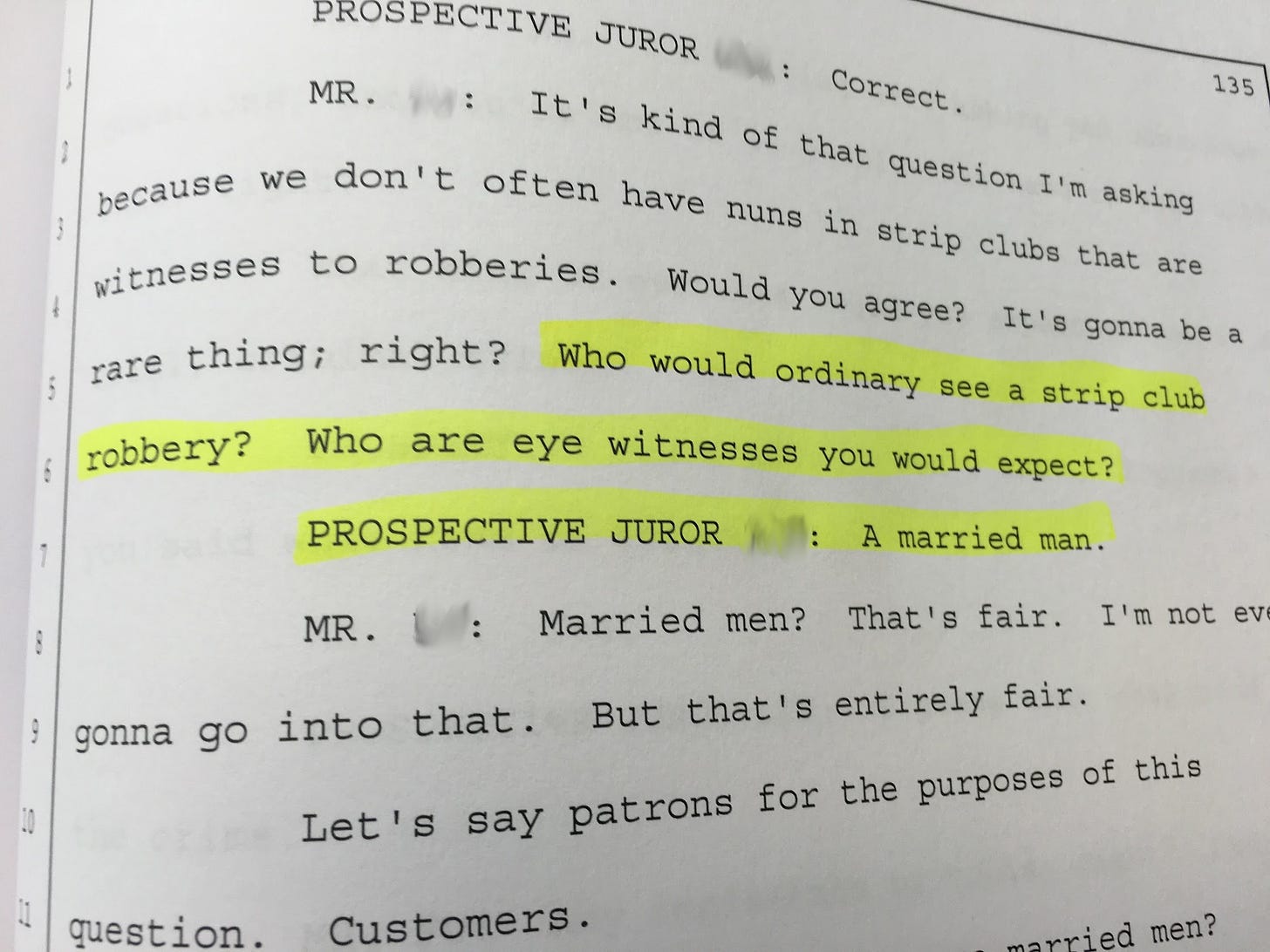






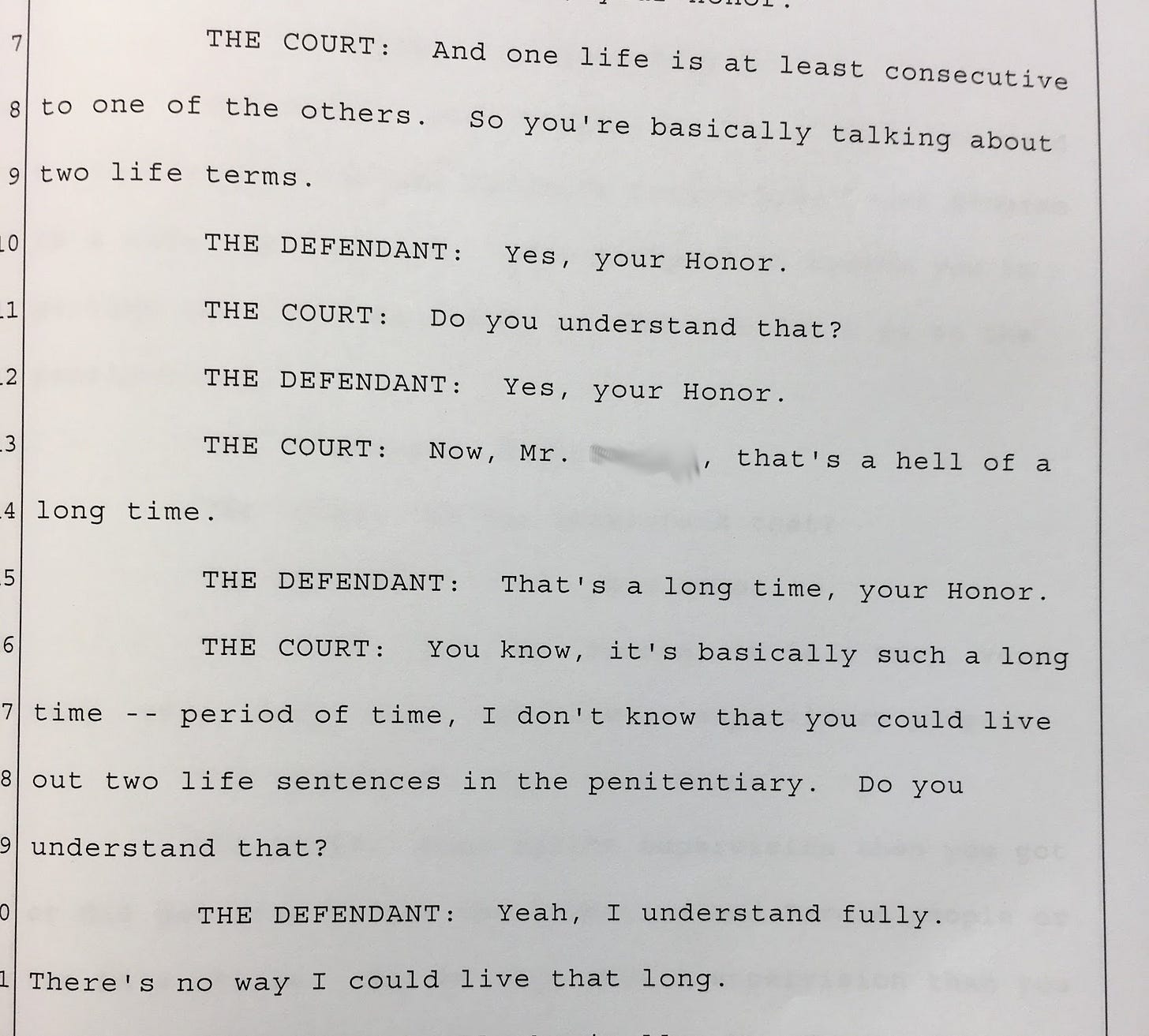









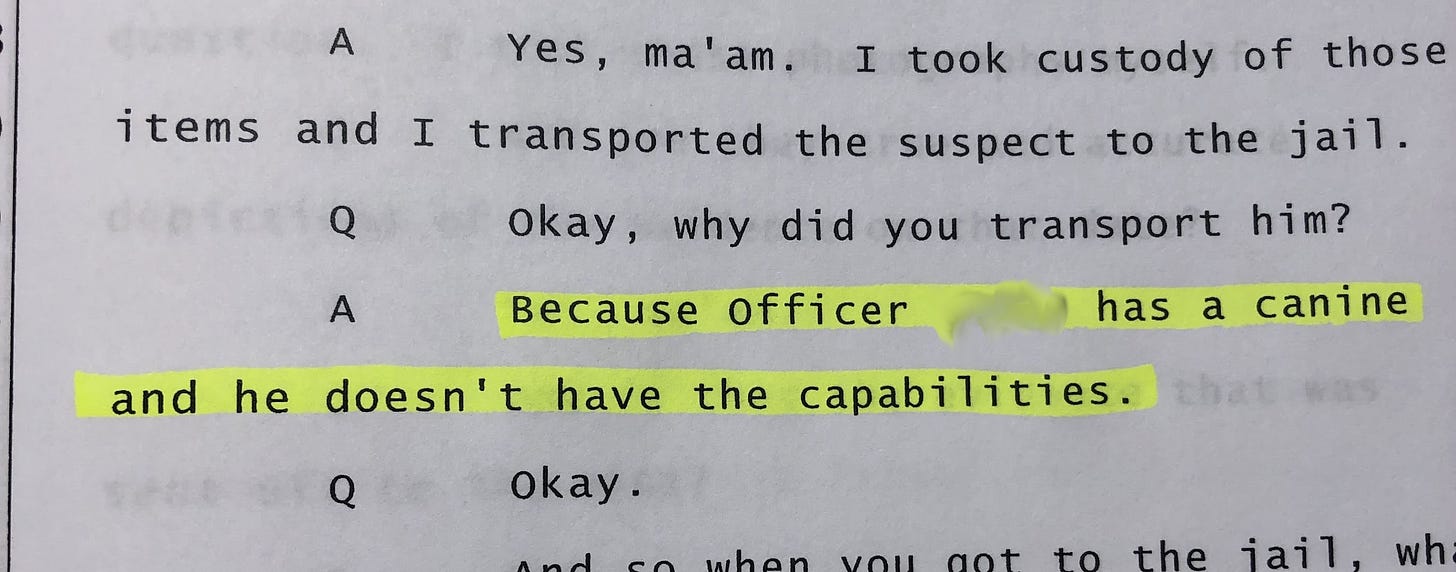

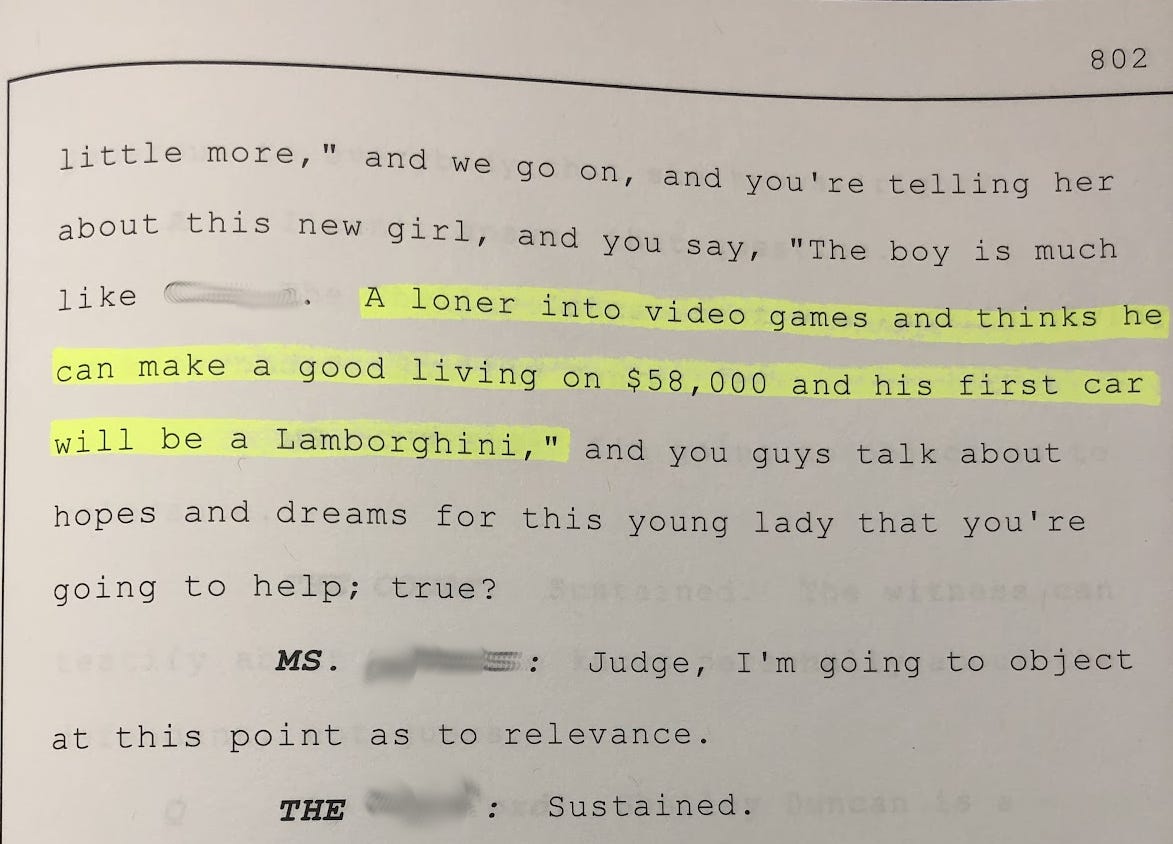

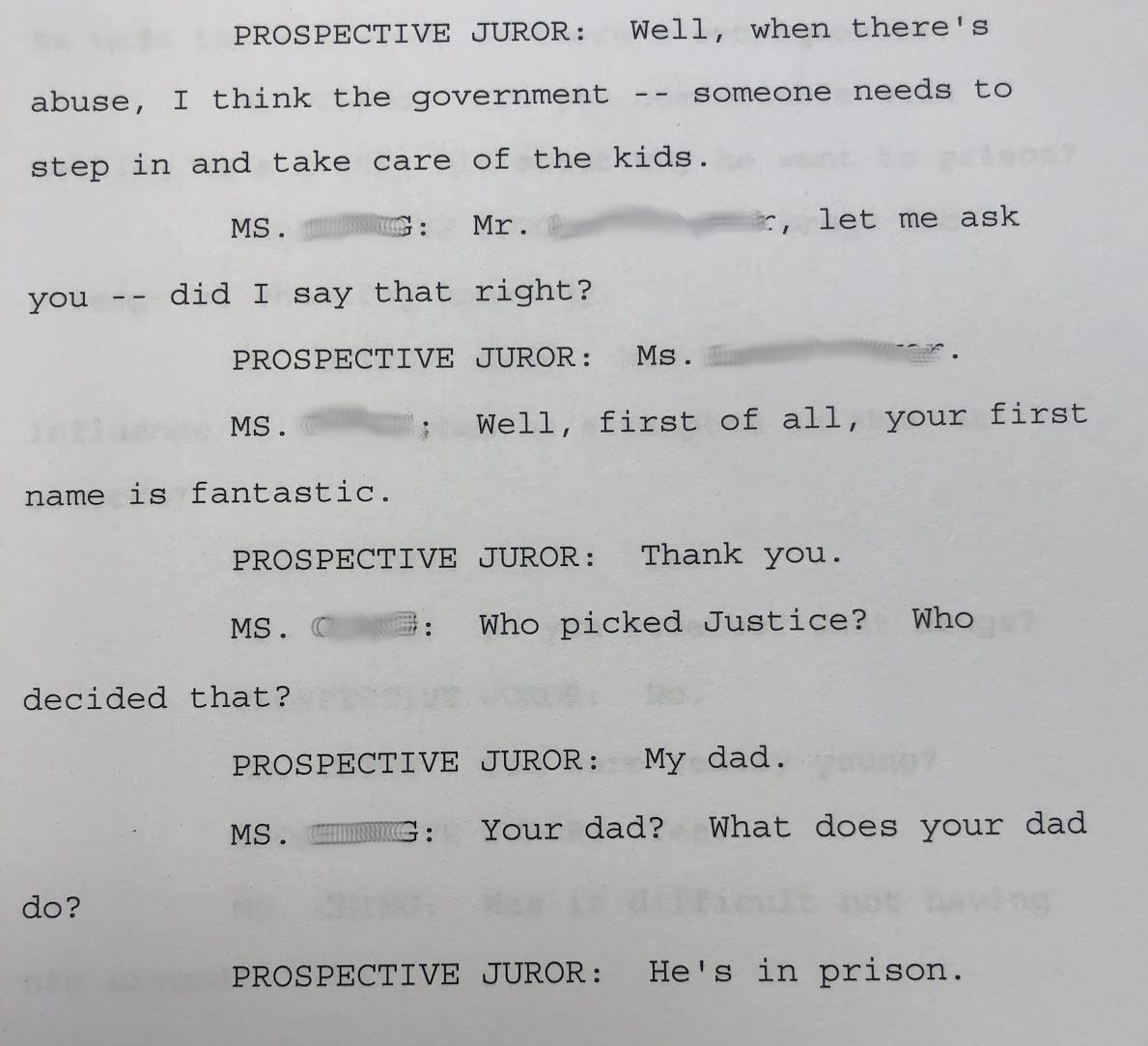

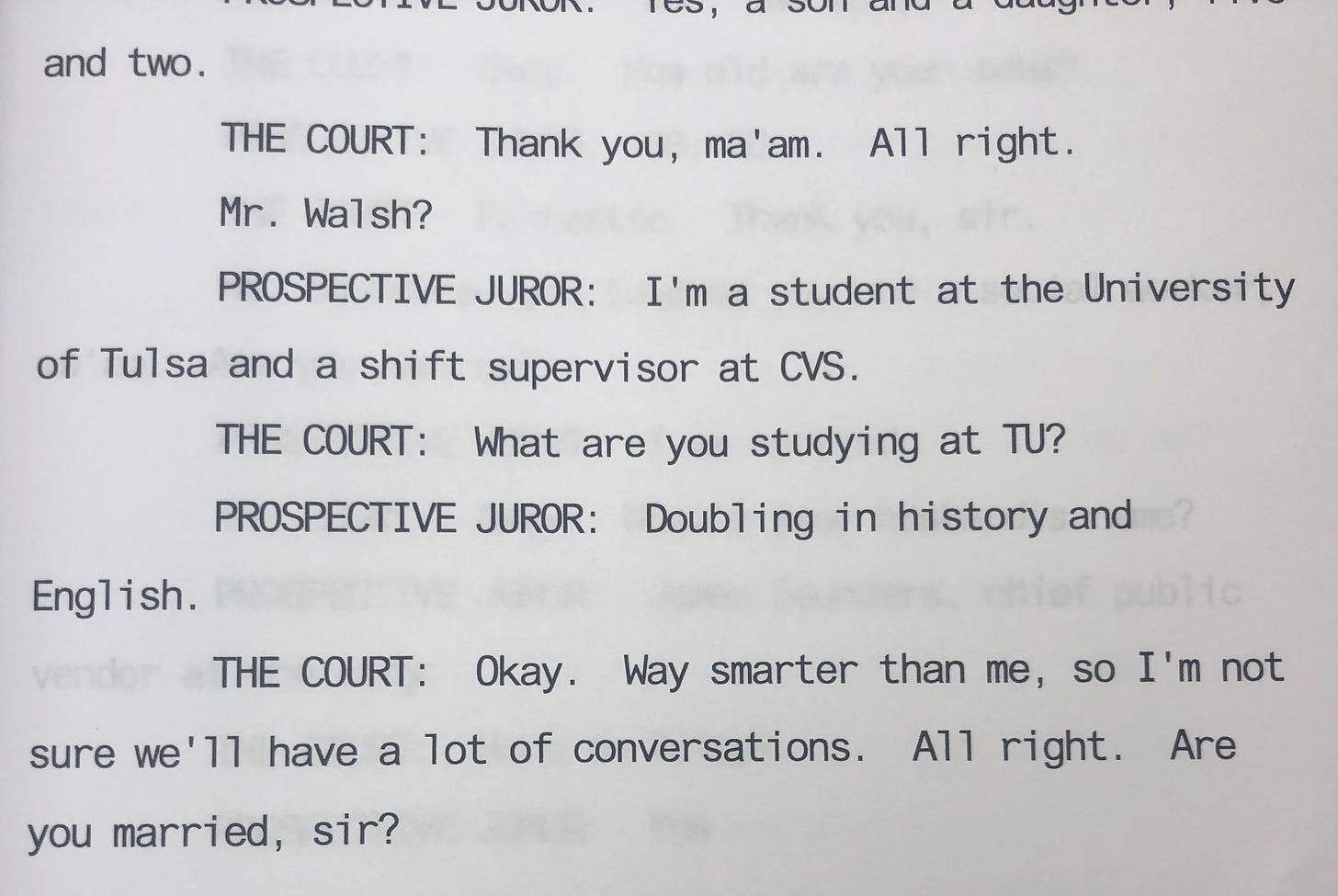

I see a photo of the couch from the Synesthesia art display at the Fred Jones Museum. I enjoyed it even though I am too big to walk through the whole thing standing up.
Wow, Lisbeth, all of this is so interesting and even entertaining. You're right, our words are important. And I pray I get it right! Have a wonderful Christmas and a bright new year!